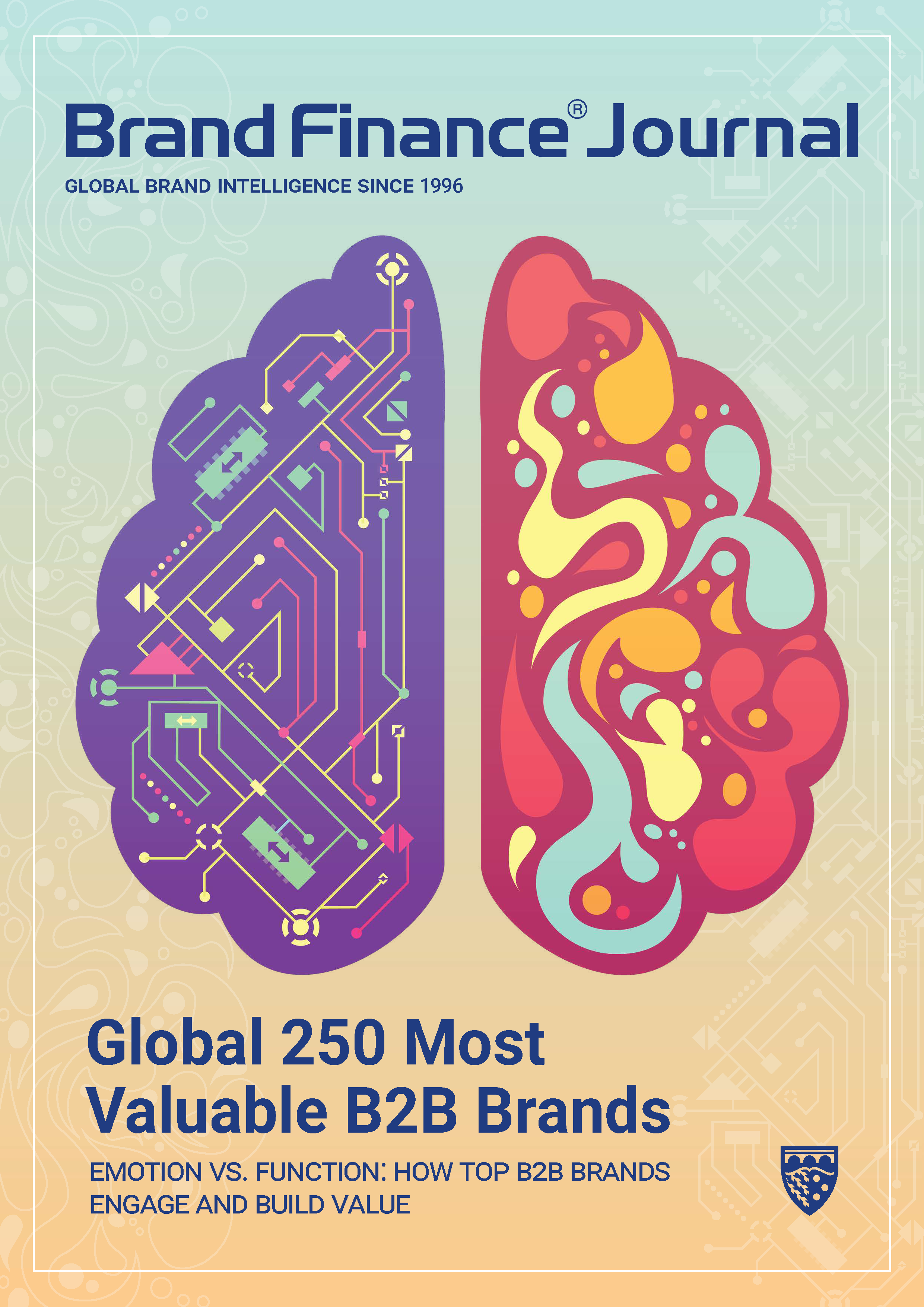This article was originally published in the Brand Finance Global Most Valuable B2B Brands Index 2025

Consultant,
Brand Finance
Evocative advertising may be perceived as the domain of B2C, but the data suggests that ads aiming for an emotional connection are as effective to engage B2B buyers.
To diver deeper into the role of emotions in B2B marketing, Brand Finance partnered with System1, a creative effectiveness platform that specialises in evaluating advertising effectiveness. System1’s Test Your Ad platform uses a proprietary tool, FaceTrace, to measure emotional response.
Participants are shown a series of facial expressions and asked to select the one that best reflects how they felt after viewing an advertisement. These responses are converted into a “Decimal Star” rating that quantifies emotional engagement. Higher scores are linked to stronger brand impact and greater potential for profit gain and market share growth.
System1 provided data for advertisements aired in both the US and UK markets between 2020 and 2025 across four key B2B categories: Business Software, Services & Payments; Business Services, Accounting & Consulting; Business & Corporate Banking; and Business Software & Services.
By integrating Brand Finance valuation expertise with System1’s emotional testing methodology, we demonstrate that emotionally engaging campaigns can significantly enhance brand value, even in sectors typically driven by rational decision-making.
Emotional storytelling drives impact
Adobe is one of the brands analysed with the highest Star Rating. Between 2020 to 2025, Adobe released a large number of ads with varying emotional impact. One of the highest-scoring ads, 'Special Delivery', aired in late 2020. It tells a heartwarming story of a girl using Adobe tools to create joy in her community, creatively launching an ice cream delivery initiative when her favourite shop closes. The ad scored 5.3 Stars—an exceptional result achieved by only 1.1% of ads in the business software and services category.
By contrast, 'Daddy DIY', which aired in 2024, scored just 1.0 Star—a level reached by 65% of ads in the same category. This ad is more functional and problem-solving in nature, focusing on how Adobe Acrobat helps a man finalise home repair contracts. The contrast between these two ads shows the power of storytelling and emotional appeal in driving stronger engagement.
Adobe’s ad with the highest emotional quality was aired in 2020. Since then, the emotional quality of its ads has declined. This trend is consistent with the decrease observed in Adobe’s Brand Strength Index (BSI) over time. According to Brand Finance analysis, Adobe’s brand strength has declined between 2020 and 2025. In 2024, there was a slight improvement in the emotional quality of its ads, which corresponded with an increase in brand strength that year.
However, both metrics dropped again in 2025. Despite this, Adobe’s strong business model and solid financial performance continue to support its overall brand value.
Creativity and surprise in B2B advertising
In B2B sectors such as consulting and technology, surprise can be a powerful creative tool. It signals originality and helps position a brand as forward-thinking. Ads that break conventions often stand out and attract attention from business decision-makers seeking innovation.
Accenture’s New Life ad features a surreal sequence of visuals, including a human eye, a dinosaur, and flashing lights, designed to provoke curiosity and convey transformation. The ad ends with the line “Let there be a change,” reinforcing Accenture’s role as a catalyst for progress.
Despite scoring highly for surprise, the ad received a low overall Star Rating on System1’s scale, which measures emotional effectiveness and potential for long-term impact. This underlines a key insight for B2B marketers: while creativity and surprise can draw attention, they need to be anchored in emotional relevance to build strong brand connections. Without that, even the most visually striking campaigns may fall flat.

Emotional drivers influence B2B decisions globally
Beyond advertising performance, Brand Finance’s proprietary market research confirms that emotional factors play a central role in B2B decision-making across sectors and regions. In Saudi Arabia, Brand Finance surveyed customers in IT, mining, and business banking to identify key brand consideration drivers.
The findings showed that emotional attributes— especially trust and leadership—consistently rank among the top influences on brand choice, across all three sectors. While functional capabilities like innovation and service delivery remain important, it is emotional resonance that helps brands build credibility and form lasting relationships with business clients.
In a parallel study of the Saudi banking sector, emotional connection also emerged as critical across both B2B and B2C segments. For retail (B2C) customers, emotional attributes like trust helped drive loyalty. For B2B clients in investment and wholesale banking, trustworthiness and prestige were the leading drivers of brand consideration. These results reinforce the idea that emotional connection is not only valuable in consumer contexts, but essential for building confidence in complex, high-stakes B2B relationships.
Happier responses, stronger outcomes
System1’s data also highlights a strong link between emotional quality and the specific emotions ads evoke. In Microsoft’s case – the world’s most valuable B2B brand - the highest-scoring ads on the Star Rating scale also generated the highest levels of happiness among viewers. These campaigns, especially those aired during the COVID-19 pandemic, focused on learning, connection, and adaptability, demonstrating how Microsoft tools empowered people in challenging times.
This emotional engagement was not only effective at a creative level. It coincided with tangible gains in brand performance.
In 2025, Microsoft’s B2B brand value increased by 33% year-on-year. Its emotionally resonant storytelling clearly played a role in reinforcing trust, relevance, and long-term brand strength.
Emotion builds equity
The combined insights from Brand Finance and System1 challenge the long-held assumption that B2B decisions are purely rational. Whether in banking, software, or industrial sectors, emotional connection is now proven to influence how business audiences perceive, trust, and choose brands.
Creative strategies that prioritise emotional resonance, whether through warmth, inspiration, or trust, are more likely to drive engagement and reinforce brand strength.
For B2B marketers, the case is clear: emotional advertising is not a departure from effective strategy. It is a key ingredient for building value, loyalty, and long-term competitive advantage.


